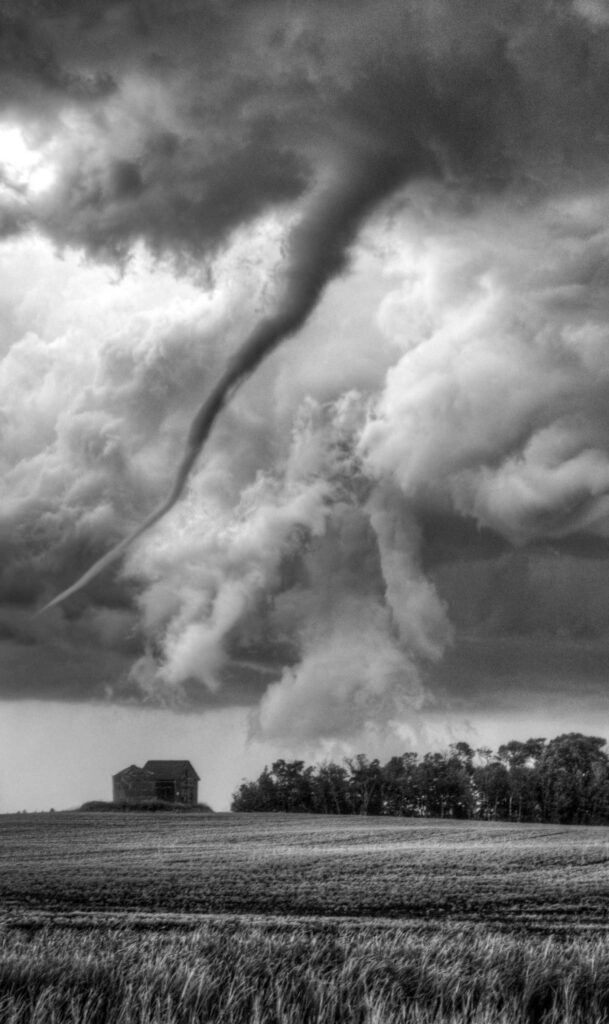The singular voice of Emer McConnell, the narrator of Jane Urquhart’s latest novel, explains, “I was born twice, you see. Once gently, and once violently, which is why, although I am not yet old, I have the stick.”
The opening pages of In Winter I Get Up at Night introduce unassuming Emer, a teacher living what appears to be a simple life in rural Saskatchewan. She rises early in the dark to drive on snowy roads to give elementary students music lessons. With a nickel-plated triangle in her bag, she refers to herself as “the change that occasionally occurs in the midst of routine,” proudly noting the way the children sit a little taller in her presence.
But rather than mirroring the simplicity of her day-to-day, the narrative unfolds to give us a temporally complex, sweeping portrait of a life lived. This artful reconstruction traverses unspeakable tragedies, personal follies, and desperate longings. Urquhart’s prose shifts between various phases of Emer’s life, detailing her intimate memories of growing up on a farm in “a man’s world” through to her adulthood, while indirectly commenting on broader historical conditions.
We quickly learn that a freak, near-death experience changed the course of Emer’s childhood. The narrative flashes back to a violent prairie storm —“the big wind”— as it descends on her family’s acreage and alters the trajectory of her life. Its otherworldly force causes a farmhouse to explode, snatches a newborn from its mother, and shatters eleven-year-old Emer’s legs. She is permanently “damaged by weather.” Her father and brother strap her to a door and carry her five miles to the nearest train track in search of help. “I was arguing with the pain, which was a fiery, pulsing orb in my mind,” she remembers. “I was trying to convince the pain that I wasn’t available, or if I was available, I wasn’t valuable enough for it to bother with.”

A prairie storm changed the course of her life.
Robert Morgan Edmonds
Emer ends up in a children’s ward undergoing multiple invasive surgeries. Her slow recovery, during an indefinite separation from her family, leads her to lean on a new community for support. Her unconventional circle consists of doctors, nuns, and a fascinating cast of “wounded children.” There’s the enthralling Friedrich, a teller of tall tales whose vibrant collection of theatrical colleagues come to visit and who remains an occasional figure in Emer’s adult life. “It was Friedrich,” she says, “who prepared me for adult love and its subsequent sorrow.” There’s Tatiana, a badly burned Doukhobor girl who appears ghostlike under a tent that keeps cloth from touching her skin. And there’s Eli, who speaks of the “bad people” dressed in white who came to his Jewish farm commune, banging together crosses, smashing windows, and threatening to burn down his home.
Urquhart brings us into the strange minutiae of the ward and submerges us in its small dramas and colourful personalities. But if Emer’s youth is determined by the aftermath of the storm, her adulthood is characterized by an impossible love. A sumptuous and sporadic affair with a sometimes married man contrasts sharply with the hospital’s surgical coolness and unexpected, authentic camaraderie. As she moves seamlessly back and forth through the memories of her convalescence and illicit rendezvous, we watch her struggle to find solace in both environments. As an adult, she yearns for the closeness she had with other patients: “It was the tantalizing possibility of this tenderness that brought me back again and again to the humiliating hotels.”
Her lover, Harp, is charming and intelligent but uncommitted. Memories of him taunt her with the same dull ache that her injuries inflicted. She describes him with empathy and adoration, but also at an unsettling distance. Harp’s early success and “brutal” fame ruined him. He took to drinking, and his friendships and marriages failed: “By the time he was forty, he knew he was his own ghost, haunting his magnificent past.” Emer feels a similar sense of ruin when she thinks about their time together. “Yes, fool that I was,” she says. “I always waited for him.”
Their trysts are both grand and fleeting. Her descriptions of their encounters have an ethereal quality to them; she compares their bodies to “two smooth, slow rivers moving over sandbars.” Emer’s scars transform under Harp’s hands. She feels both taken by and taken over by him, thinking of their relationship as an act of colonization: “Because I could never recover from the advance of his armies, from the catastrophic stillness he caused in me each time we met.” Despite her strong feelings, Emer is realistic and resigned in her longing. She realizes that their love “was like those castle hotels: full of private hidden spaces and beautiful velvet furniture, and no responsibility for tidying up afterwards.”
The prairie landscape provides a spare backdrop for Emer to immerse herself in thought. “I have spent a lot of time, now,” she says, “measuring seduction against the world’s larger catastrophes.” In Winter I Get Up at Night is about the nature and scale of both pain and pleasure, but also about their intersection and interchangeability and how their definitions inexplicably bleed into one another. Both romantic and familial love are sources of great distress. The reader comes to learn that Emer’s “beautiful and destroyed” mother had a complicated extramarital connection with a mysterious teacher. Similarly, Emer’s brother, Danny, turned away from desire and toward religion and spirituality, only to find his cloistered life is forever complicated by the decisions of others.
Beyond the real and enduring distress of Emer’s injuries, we’re presented with emotional wounds and asked to decipher the worth of love in the face of such pain. “I adored him,” she says of Harp. “But he never loved me.” Across the book, what should be joyful remains hidden in the shadows, causes harm, or only briefly soothes suffering.
“After years of trying to solve the mysterious and maddening puzzle of this,” Emer says of her romantic entanglement, “I now finally understand that if I hadn’t loved him, I wouldn’t have felt either the pain or the happiness.” This revelation, which comes early in the novel, resonates well beyond the scope of Emer and Harp’s troubled union. Throughout Urquhart’s deftly crafted story is the enduring notion that when it comes to life and love, joy and sorrow are inescapably linked.
Stacey May Fowles has published five books. Her latest children’s title, Out of the Box, will hit shelves this fall.

